Best VR headsets for Android: step into another world
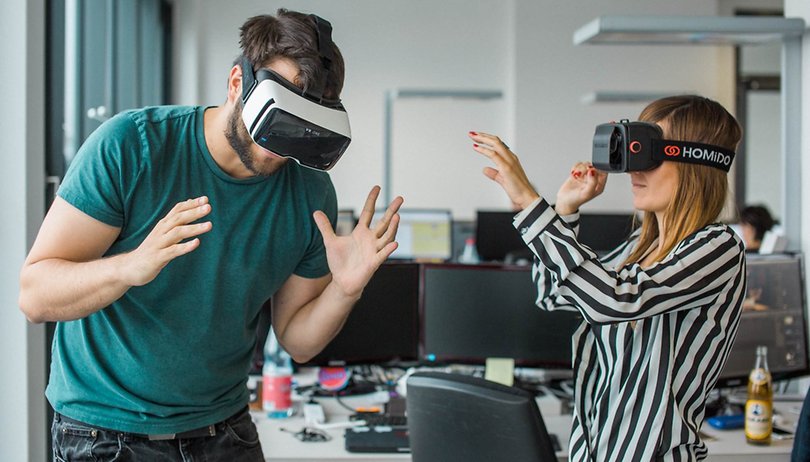

Despite 2018 being a relatively slow year for VR, the trend is here to stay. Android users have more and more choices between headsets - from cardboard contraptions to high-end devices. In this best-of list, we'll go over the available options, their characteristics, and present the ones we think most users will enjoy.
Jump to section:
- VR headsets: what you should look for
- Cardboard VR glasses
- Merge Goggles
- Daydream
- Lenovo Mirage Solo
- Samsung Gear VR
- Virtual reality outside of Android
The best VR headsets for Android: too many good options
First, a warning for the myopic among us. Most smartphone VR headsets are unsuitable for people who wear glasses. Your eye area should be as close as possible to the VR headset as possible. Those who wear glasses will find it near impossible to have a pleasant viewing experience, seeing as sometimes glasses frames are bent, there are greasy prints on your lens, clouding your view into the virtual world.
Those who are only slightly short-sighted and have no corneal curvature may possibly get by without their eyeglasses. Especially if a diopter adjustment lens is supported with a small dial. But this is not a solution for every bespectacled user.
The contenders for the top spot in Android VR - Google and Samsung
Currently, there are three VR platforms for Android that require different VR headsets.
Google Cardboard is not only the name of Google’s cardboard glasses, but also the name of the platform for which there are many games in the Play Store. Daydream is a more elaborate new release, which also regulates the technical details on the smartphone. With the Gear VR, Samsung has also entered the ring.
Cardboard headsets work basically with most smartphones, Daydream requires the smartphone to be certified, and Samsung limits its platform only to the current high-end smartphones since the release of Galaxy S6.
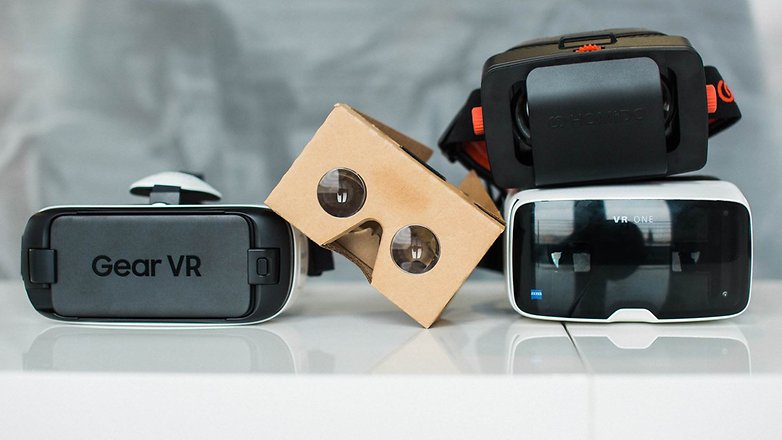
Cardboard
If you don’t really know whether virtual reality is right for you, you should try the paper-based Cardboard headset for a cheap introduction into the world of VR.
Numerous versions of these VR glasses are offered by different manufacturers, but the principle is always the same: the frame of the glasses is made from cardboard, and the VR-capable smartphone is simply clamped in front of the two lenses.
A strap to fasten the headset to your head is not always offered for all Cardboard versions, so you need to hold it with your hands. This is unwieldy in the truest sense of the word and, thus, more suitable for VR demos or light apps than for games. All things considered, the VR experience is satisfactory overall, despite the spartan equipment.
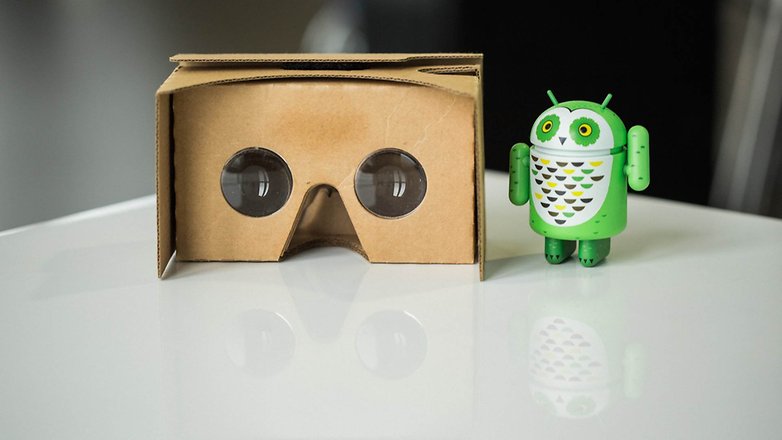
Merge VR Goggles
A step above the cardboard headsets are the Merge Goggles. Just like their cardboard cousins, they are designed to hold your VR-capable smartphone. They do have some advantages, however. The Merge Goggles are made from foam, making them more comfortable but also water-resistant and easy to clean - ideal for kids. The headset also comes with a strap. Despite this, it retains a low price of $29.99. It's Android and iOS compatible and fits phones from 123mm to 158mm in size - a great beginner headset for those who are still unsure about virtual reality.
Daydream View
Daydream is Google’s more complex virtual reality platform: here, Google defines not only the VR headset, but also demands on the smartphone. Daydream requires a controller. The platform is also compatible with Google's newest Pixel smartphones.
The official Google headset for the platform is the Daydream View. In our review of Daydream View, the headset did quite well: the comfort when wearing them and the quality of the platform are very good. However, it is dated compared to its Lenovo competitor.
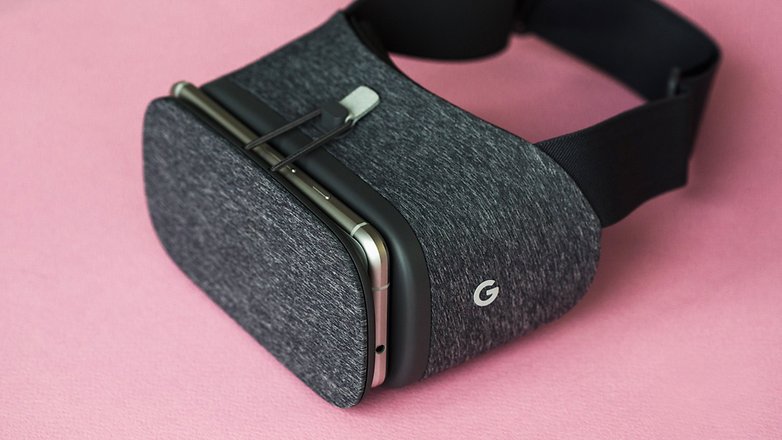
Lenovo Mirage Solo
Lenovo's Mirage Solo is the long awaited upgrade of the Daydream View. It is the first standalone headset running on the Google Daydream platform and it packs pretty powerful specs.The device comes equipped with 4 GB of RAM and 64 GB of internal storage, which can be further expanded with microSD. The Mirage Solo is powered by a Snapdragon 835 and has pretty spectacular graphic capabilities for a standalone headset.
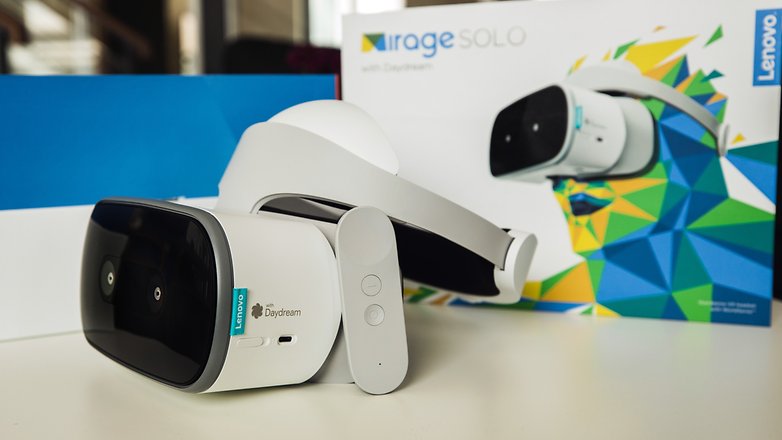
The most exciting feature is the support for Google "WorldSense", an improved position tracking technology. Motion-control games are available, but unfortunately you still have to use the Daydream remote to navigate in most games.
At $399.99, the Mirage Solo is also a bit on the pricey side, but you have to consider that it does not require an expensive gaming PC or high-end smartphone to function.
Samsung Gear VR with controller
Together with Oculus, Samsung has developed the Gear VR, its own VR headset, which has two special features: firstly, there’s an exclusive Oculus Store, where VR games and apps are available. Secondly, Gear VR only supports high-end smartphones from Samsung.
The latest SM-R324 version of the Gear VR supports Samsung smartphones with microUSB and USB Type-C, which include the Galaxy S6, S6 Edge, S6 Edge +, Galaxy Note 5, Galaxy S7, S7 Edge, Galaxy S8 and S8 Edge.
If you've got the Galaxy Note 8, then you'll want the newer SM-R325 version, which supports the larger phablet.
As an added bonus, Samsung has now added a special controller with the latest versions of the Gear VR.
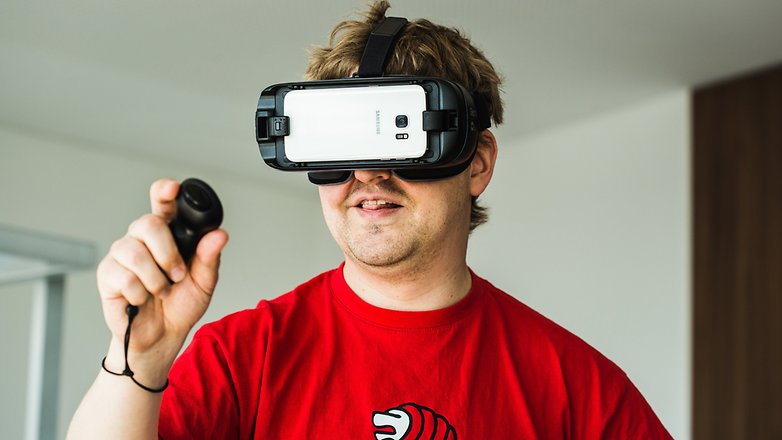
The Gear VR feels just fine and sits comfortably as it is quite light. If it is still too heavy, an additional strap can also be pulled over the head, whereby the weight is displaced.
Originally, the Gear VR platform did not come with its own controller, though things have changed with the introduction of the new generation. The new Gear VR controller has a trigger button, a touchpad with click function and dedicated Home, Back and volume control buttons. It's very comfortable to hold and enables you to easily access Gear VR apps.
All in all, the controller is the highlight of the new Gear VR. If this isn't enough to convince you, well perhaps taking a look at our test will do the trick:
VR Headsets: what’s happening outside the Android world
There is indeed a world of virtual reality outside of Android: the concept was embraced by Sony with Playstation VR and HTC with HTC Vive, both of which work on their own platform and software. The entire hype was started by Oculus, which was bought by Facebook, and its Rift headset.
Oculus Go
Oculus Go is yet another standalone headset, this time from the makers of the ever popular Rift. It runs a custom version of Android, and is in many ways similar to the Lenovo Mirage Solo. Its hardware might be a bit less powerful but it compensates with a lower price tag of $200. Read more about it here.
HTC Vive Pro
This year HTC decided to appeal to harcore gamers only. The 'professional grade' VR headset has dual AMOLED screens with a combined resolution of 2880x1600, as well as multiple fancy sensors for a more immersive experience - G-sensor, gyroscope, promixity and ipd sensor. However, the Vive Pro requires a high-end gaming PC equipped with the latest GPU. On top of that, the whopping $799 price does not include any base stations or controllers. Definitely not a device for VR newbies.
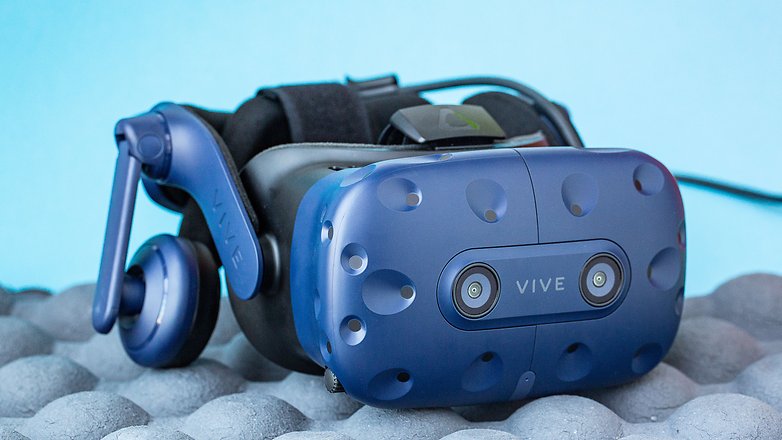
PlayStation VR
Clearly cheaper are Sony’s virtual reality headset, PlayStation VR at $399.99, but you also need a PlayStation 4, which you can buy for $299.99. VR fans also need a suitable camera and, depending on the game, a PlayStation Move controller.
Compared to buying a gaming PC, the PlayStation version is still cheaper. What’s more, the PlayStation solution has a big selection of games. More than 100 games are being developed for the PlayStation VR.
Have you fallen prey to VR fever or do you prefer to stay in the real world? Which VR headset do you use? Let us know in the comments.









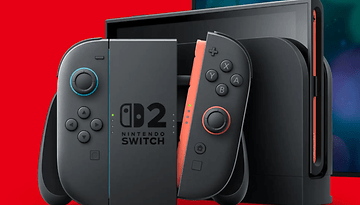










Thanks now i know what to buy
Samsung Gear VR with controller is so darn good. I'm using it for about a week now.
The Samsung Gear VR is by far the best VR headset available right now, based on reviews, ratings and purchases made.
I've ordered mine here (cheapest offer available) and I'm super satisfied with them:
no-fuel.org/product/samsung-gear-vr-virtual-reality-headset-us-version-with-warranty/
Dear Author,
The Samsung Gear VR is also an Oculus VR headset and is OUTSIDE the Android world, as it runs on the Oculus platform as does the Oculus Rift. Samsung entered in to a partnership to distribute Oculus in 2014 and it is NOT affiliated with Android. Just as the Samsung Gear S2 and S3 are Tizen Watches and NOT Android Wear watches. This type of incomplete information paints a fragmented hardware picture for the Android ecosystem. The OEM's, and Samsung in particular, use a variety of software platforms outside of Android to support their varying hardware initiatives outside of Google's.
Technically "under $100" then :) BTW I have the Innori headset (although it's unbranded) and it came with a controller. Also my Nexus 6P only just fits into it.
Thanks for the review of our Freefly VR ;-)
The Freefly VR headset is great!
LETS HAVE IT
Cardboard fabric in my house economy $15
I will get one. Let's try VR.
Thankfully, it doesn't cost much to give it a try! As this article shows, there's plenty of choice.
Technology should be cost effective so that every one can try it.